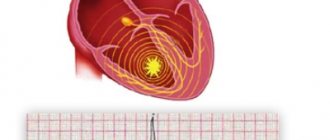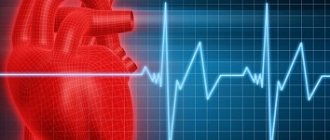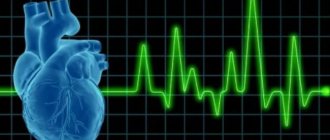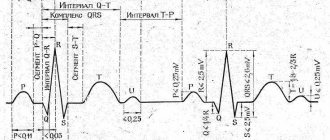11.11.2018 · Pro Psychosomatics · Comments: ·
It is no longer a secret to anyone that the causes of many diseases lie within the person himself and are caused by his emotional state. Today we’ll talk about the heart, let’s look at why the psychosomatics of arrhythmia (heart rhythm disturbances) appear and how to work with it.
You need to understand that heart rate can change even in a healthy person. For example, when we are calm, our heartbeat is normal. But if we play sports, it naturally increases.
The pathology differs from the norm in that accelerations and decelerations occur regardless of physical activity.
There are two main causes of heart rhythm disturbances:
1 - physiological (diseases of the cardiovascular system),
2 - psychological (constant stress caused, for example, by a feeling of fear).
Arrhythmia has psychological causes if you notice that it is stress that leads to the feeling that “your heart will jump out of your chest.” But a medical examination (even with such symptoms) shows that everything is fine with the organ.
The connection between the psyche and the heart is simple and clear.
Those who have problems with rhythm disturbances know very well that there is no need to be nervous. This is what makes it worse. That is, the emotions we experience directly affect us. The work of the heart is closely related to the work of the brain.
Therefore, it is very important to learn to react to events in such a way that these reactions do not cause a response in the body. That is, the heart should work normally regardless of your emotional background. How to do this is discussed below.
What are the causes of psychosomatic arrhythmia?
If the heart rhythm is disturbed, the pressure usually jumps and the pulse rate is disturbed (this can be checked on the wrist).
At first glance, it is very difficult to distinguish a psychosomatic nature from a physiological one based on these signs. And doctors won’t even suggest you do this.
How to understand that you have psychosomatic arrhythmias?
Very simple.
If you feel that your heartbeat is disturbed at those moments when you have an emotional outburst (anger, fear), this clearly indicates reasons of an emotional nature. You can get very scared - and this will also affect your heart function. Some people experience trembling, numb limbs, and a feeling of lack of air.
At the same time, when a person notices a rapid heartbeat, he may be overcome by the fear of sudden death, the heart begins to beat even faster, and this raises the fear that it will stop altogether.
All this points precisely to psychological reasons. Moreover, according to statistics, melancholic people are usually susceptible to them.
What lies behind the reason is most often 2 emotions: anger and fear. The second of them is the main one.
The fact is that during fear, the body releases various hormones (for example, adrenaline) and other substances that pass through the heart. The organ experiences their influence even in a healthy person. However, it does not cause any problems; the effect is usually short-lived.
Increases and delays appear most often in those who had an initial predisposition. That is, the emotion of fear in another person will have an impact, for example, on the stomach (read our article on the psychosomatics of the stomach and duodenum here). Because that will be his predisposition.
It should be noted that the various tables on psychosomatics are very general. And in practice, we, as specialists with psychological and medical education, have been convinced hundreds of times that each person has an individual reason.
Psychology of illnesses: Heart (problems)
HEART (PROBLEMS) - (Valery Sinelnikov)
Description of the cause
Pain in the heart arises from unsatisfied love: for oneself, loved ones, the world around us, for the very process of life. People with heart disease have a lack of love for themselves and for people. They are prevented from loving by old grievances and jealousy, pity and regret, fear and anger. They feel lonely or afraid of being alone. They do not understand that they create loneliness for themselves by fencing themselves off from people, relying on old grievances. They are weighed down by emotional long-standing problems. They fall like a “heavy burden”, a “stone” on the heart. Hence the lack of love and joy. You are simply killing these divine feelings in yourself. You are so busy with your own and other people's problems that there is no place or time left for love and joy.
“Doctor, I can’t help but worry about my children,” the patient tells me. “My daughter’s husband is a drunkard, her son separated from his wife, and I’m worried about my grandchildren, how they are, what’s wrong with them. My heart hurts for them all.
“I understand that you only want the best for your children and grandchildren. But is heartache the best way to help them?
“Of course not,” the woman answers. - But I don’t know how to do it any other way.
The heart often hurts in those people who are filled with pity and compassion. They strive to help people by taking on their pain and suffering (“A Compassionate Man,” “The Heart Is Bleeding,” “Taking It Close to the Heart”). They have a very strong desire to help loved ones and people around them. But they are not using the best methods. And at the same time they completely forget about themselves, ignore themselves. Thus, the heart gradually closes to love and joy. His blood vessels narrow.
Pity and compassion are not love. Be merciful, not compassionate. Have a sweet heart. Help people with love and joy. Combine love for people and love for yourself. It is important to understand that I can only share with another person what I have. If I have a lot of good and bright feelings, then I can share it with my loved ones.
To be open to the world, to love the world and people, and at the same time remember and take care of yourself, your interests and intentions - this is a great art. Remember? “Love your neighbor as yourself!”
Why do people forget the second part of this commandment?
A person with good intentions, who understands, realizes and accepts his place and purpose in the Universe, has a healthy and strong heart.
A good heart never hurts,
And what is bad becomes heavier.
Evil has destroyed more than one heart.
Have a good heart
Be able to return kindness for kindness.
I have found that people with heart disease believe in the need for tension and stress. They have a predominantly negative assessment of the world around them or any events and phenomena in it. They view almost any situation as stressful. This is because they have not learned to take responsibility for their lives. Personally, I divide all situations in my life into two categories: pleasant and useful. Pleasant situations are those that give me pleasant experiences. And useful ones are those in which you can learn something important and positive.
I have a friend who is a bathhouse attendant. He is already seventy years old. Celebrated the golden wedding. Recently he told me about himself.
— Fifteen years ago I was hospitalized with a suspected heart attack. I had a hard time then. I thought that the end had already come. Well, nothing, the doctors supported me and treated me. And when I was discharged, one smart doctor told me: “If you want to have a healthy heart, remember: never scold anyone or quarrel with anyone. And even if someone nearby is scolding someone, run away from there. Choose good people for yourself and be kind yourself.”
So I remembered his words for the rest of my life. If they swear on the trolleybuses, I get out and take a minibus. Retired neighbors joke: “Semenych has become a rich man, he drives around in a taxi.” But I think that you should not save on your health.
But now I can steam three people at once in a bathhouse with a broom. And I feel great.
One of my patients with heart disease often used the following phrases in conversation:
- Doctor, I feel sorry for people all the time.
— I condemn “in the hearts.”
- I take it to heart.
- The world is so unfair.
“Take to heart”, “Compassionate person”, “Stone on the heart”, “Heart bleeds”, “Cold heart”, “Heartless” - if you use such phrases, then you have a predisposition to heart disease or already have one sick. Stop carrying something unpleasant in your heart. Free yourself, smile, straighten up, feel light and free.
What role do parent-child relationships play in psychosomatics?
Child-parent relationships play a special role in the formation of fears (this is where the trauma of rejection arises and traumatic situations occur). Which greatly affects reactions in adulthood.
For example, low self-esteem in clients often indicates strict upbringing by parents, their approval only for desirable behavior and rejection for undesirable behavior. As a result, an assessment of oneself simply cannot be formed, and instead a dependent self-esteem is formed (what will they say about me).
This leads to anxiety and fear of the future (although at the root lies the fear of the mother figure: her disapproval and rejection). Then, through this emotion, relationships between spouses (or with colleagues) begin to build. A person “hangs” the image of a strict parent on others, he himself is afraid, he himself is angry.
Of course, all this can be seen very clearly during consultations. But it is not at all obvious to the client himself before starting work (because it is very difficult to analyze oneself; even professionals undergo supervision from other psychotherapists in order to work out their own distortions).
Arrhythmia and tachycardia are dangerous diseases
Arrhythmia and tachycardia are dangerous both as diseases that lead to heart rhythm disturbances, and as tachycardia itself, since arrhythmia can have a damaging effect on the heart (deplete the heart muscle, disrupt the functioning of the heart valves, cause an increase in the size of the heart cavities) and cause progressive heart failure. In addition, atrial fibrillation - atrial fibrillation - is the cause of every fifth ischemic stroke. An ischemic stroke in a patient with atrial fibrillation often ends in death and, compared with a stroke of another nature, leads to the most severe disability and is more likely to recur. There are arrhythmias, the symptoms of which are dangerous, even life-threatening; Most arrhythmias, having appeared once, progress; and advanced cases are difficult to treat. That is why the patient needs to consult a specialist if there is any suspicion of arrhythmia.
Currently, the doctor has diagnostic and therapeutic techniques that make it possible to identify, control and eliminate arrhythmias. To prevent the disease, it is necessary to lead a healthy lifestyle, eat right and exercise.
How is psychosomatics of heart rhythm disturbances treated?
Having realized that the reason lies in your emotional background (and it is usually associated with an emotion such as fear), you should begin treatment in this proven way:
1 - It is good to be examined for physiological disorders and do not ignore this issue. Be sure to visit a doctor.
2 - But sustainable improvement and recovery will begin when you work on your emotions.
Think about what exactly could be the root cause. What situation triggered the disease? When did you first notice it? Perhaps there is a situation that you still “carry within yourself” and you cannot work through it?
If you cannot remember it and understand that the condition has worsened over a long time, this indicates that the situations were layered on each other.
Try to answer what you are afraid of, for how long and why?
3 - It is necessary to completely stop smoking (it greatly affects the state of the cardiovascular system).
4 - Sports wouldn't hurt. Not only will it allow you to improve your circulatory system, but it will also have a beneficial effect on your emotional state (here about how sports helps with depression and anxiety).
5 - Pay special attention to those situations that cause stress. If you clearly know what these cases are, try to minimize them;
If this does not work out (for example, you experience constant stress at work), you need to work with your condition so that the body no longer has such a reaction to them in the form of heart rhythm disturbances.
This is more than possible with constant work with special psychological techniques. That is, the situations will remain, but your perception of them will change, which will not cause previous reactions. Accordingly, the heart will not have to pass through itself a set of hormones and chemicals that affect acceleration and deceleration.
6 - Breathing practices, art therapy and music therapy are effective.
It takes quite a long time to master these techniques yourself. Therefore, the easiest way is to seek help from a psychologist. A specialist will help:
- find your specific reason,
- select precise techniques, master them and consolidate them until results appear.
7 - Learning to relax.
Meditation, daily routine, rest, hobbies - all these are necessary conditions for recovery. The psychosomatics of arrhythmia go away faster when you simply learn to relax.
How to program yourself for recovery
It is necessary to realize that arrhythmia is the result of personal fears, stress and anxiety. And that fear caused by arrhythmia only aggravates the condition. That is, there is no real threat to health if an examination by a cardiologist does not reveal any diseases. This means that healing depends only on you, on inner harmony and getting rid of fears. There are hundreds of thousands of types of fear, as well as the reasons for its development. But in general we can name the following problems:
- diffidence;
- fixation on the comfort zone;
- low self-esteem;
- ignorance of one's own potential;
- psychotrauma.
To effectively get rid of fears and arrhythmia, we recommend taking a course of psychotherapy. A specialist will help you deal with past traumas, set priorities and find goals in life. Sometimes arrhythmia is associated with childhood trauma, for example, ridicule from classmates or humiliation from parents. Then you need to get rid of the “be on guard” attitude, learn to trust people, find and feel support in life.
It is important! Sometimes treatment requires medication, such as antidepressants or anti-anxiety medications. But only a psychotherapist can prescribe them. Self-medication is dangerous!
How to cope with psychosomatics faster
Watch the video from our psychologist with more than 20 years of experience, Olga Kopylova. In it she talks about how psychosomatics is formed:
Two points are important: getting to the exact cause and choosing the right psychological techniques. If you break down all the work into stages, then it would be more advisable to go this way:
- determine the initial situation,
- specify the root emotion (anger, guilt, shame, grief - each has its own),
- select appropriate psychological techniques,
- check the correctness of their implementation,
- adjust the emotion (develop new reactions to provocations).
Moreover, you can take the first step to find the cause today. To do this, take our test:
Take the test
Example : you can read for a long time about constipation - that these are mental blocks, dislike for yourself. But in 95% of cases it appears in a state of choice, in limbo. If you have basic mistrust and anxiety, constipation becomes chronic and worsens during the period of choice.
Consequently, situations with choice will never end, but the attitude towards them can be changed using psychotherapeutic methods.
What do the majority do?
They study the theory, but do not achieve improvement.
The fact is that working independently with your unconscious requires a lot of preparation.
Do you need a specialist?
It will just be faster with him. It’s possible to cope on your own, but only a few can do it and it takes a long time.
In our practice, the terms varied from 1 consultation to a year. Quite common cases are:
- hemorrhoids in women,
- a sore throat,
- herpes,
- lungs (for example, bronchitis),
- various allergies,
- childhood illnesses through parents and others.
You can find out about working with us here. Moreover, the psychosomatics of arrhythmia are quite amenable to correction. I wish you health and psychological comfort.
Read also
Heart rhythm disturbances
What Are Heart Rhythm Abnormalities? Heart rhythm problems occur when the impulses that coordinate the heartbeat travel in the wrong direction, with more…
Read more
Cardiomyopathy and its types
Cardiomyopathy is a heart disease that causes the heart muscle to weaken, impeding cardiac output and interfering with normal blood flow. This condition can lead to heart failure.…
More details
Cardiac ischemia
Coronary heart disease is a disease that can begin at an early age and remain asymptomatic for decades. The disease is characterized by damage to the coronary arteries due to a violation...
More details
Dyspnea
What is shortness of breath? Few sensations are as frightening as not being able to take a breath. Shortness of breath, or dyspnea, is often described as intense chest tightness, air hunger, or a feeling...
More details
Coronary artery bypass grafting
The concept of coronary artery bypass grafting This surgical intervention is one of the first and most effective approaches to the treatment of heart disease. After the intervention, patients feel improvement...
More details










